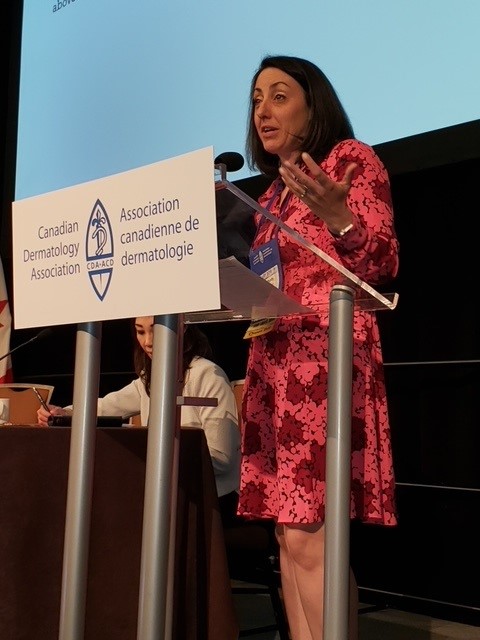Menu
Leading by example in CanMEDS roles, advancing understanding in medical education

September 19, 2023
| Author: Royal College Staff
 3 MIN READ
3 MIN READ
This year’s winners of the Donald Richards Wilson Award and the Duncan Graham Award are recognized for their example in CanMEDS integration and challenging assumptions in medical education.
Celebrate a peer with a nomination! The call for 2024 National Awards applications is now open.
Dermatologist lauded for her emulation of CanMEDS Roles
Dr. Kerri Purdy is the recipient of the 2023 Royal College Donald Richards Wilson Award for CanMEDS Integration.
Although she is heralded as a champion of the CanMEDS Framework in Dermatology, Kerri Purdy, MD, FRCPC, says it’s not something she consciously focuses on during her work day.
 Dr. Kerri Purdy speaks at the 2019 Canadian Dermatology Association Conference as President-Elect (submitted photo)
Dr. Kerri Purdy speaks at the 2019 Canadian Dermatology Association Conference as President-Elect (submitted photo)
“I think it’s probably something that just happens more naturally in terms of the way that I would tend to go about my day and my practice,” says the head of Dermatology at Dalhousie University. “But I think it’s important to think about those things at least peripherally in day-to-day practice.”
Colleagues agree that Dr. Purdy lives the CanMEDS Roles in her work. “She has shown time and again that she is a Leader, Scholar, Professional, Health Advocate, Communicator and Collaborator,” says Dalhousie assistant professor Ashley E. Sutherland.
“She has been incredibly successful at integrating CanMEDS into our Dermatology curriculum because she completely embodies these attributes in her daily life and through her never-ending commitment to Dermatology education,” Sutherland adds.
As program director over the past few years, Dr. Purdy has arranged for numerous visiting speakers from the local area and across the country to attend academic sessions.
“These lectures have focused on advanced Dermatology and relevant associated subspecialties such as Infectious Diseases or Clinical Immunology and Allergy, but they have also focused on communication, giving feedback and conflict resolution,” says Dr. Sutherland. “She seeks every opportunity to enhance our residents’ learning experience and is excellent at identifying areas to improve not only their medical knowledge but also their interpersonal skills and professional development.”
A few years ago, as president of the Canadian Dermatology Association (CDA), Dr. Purdy and colleagues discussed the benefits of sharing such insights to Dermatology residents across the country, especially for those who didn’t have as much access to subspecialty experts. It was suggested that they do a podcast, to which Dr. Purdy recalls responding: “What is a podcast?”
Much has changed since then and she just completed her fifth season as host of the popular Dermalogues podcast, produced and shared by the CDA.
Dr. Purdy recently completed her term as president of the CDA, a role that required rapid-response leadership during the COVID-19 pandemic. To ensure the continuation of Canada-wide collaboration and learning, she quickly developed a regular webinar series for residents and dermatologists. She also developed a national Dermatology curriculum for residents when in-person academic sessions became virtual.
Strengthening cultural dimensions of learning through research
Dr. Christopher Watling is the recipient of the 2023 Duncan Graham Award for Outstanding Contribution to Medical Education.
Christopher Watling, MD, FRCPC, an internationally recognized scholar in medical education and sought-after expert on the development, growth and accreditation of residency programs in Canada, is currently acting vice-dean, Education, Scholarship and Strategy, and director of the Centre for Education Research and Innovation at the Schulich School of Medicine & Dentistry at Western University.
 Dr. Christopher Watling at Karolinska Intitutet in Sweden, during his week as a Karolinska Institutet Prize for Research in Medical Education (KIPRIME) Fellow in 2022 (Photo credit: Erik Cronberg)
Dr. Christopher Watling at Karolinska Intitutet in Sweden, during his week as a Karolinska Institutet Prize for Research in Medical Education (KIPRIME) Fellow in 2022 (Photo credit: Erik Cronberg)
Dr. Watling was previously associate dean for Postgraduate Medical Education at the Schulich School, where he facilitated the launch of new residency programs in Pain Medicine, Child and Adolescent Psychiatry, Geriatric Psychiatry, Palliative Care and Infectious Diseases. He also led the transition of the school’s residency programs to a competency-based medical education (CBME) model.
With an impressive body of scholarship, Dr. Watling, a neurologist, is a leading expert in qualitative research methods in medical education and an in-demand speaker nationally and internationally. His research explores what makes particular learning experiences meaningful for training physicians, with the aim of strengthening both the individual and cultural dimensions of learning.
Dr. Watling studies how feedback can have the biggest impact, how challenges in coaching and assessment can be effectively addressed, and how professional culture impacts teaching and learning. He has shared his findings through 122 published papers and 129 conference presentations.
Across various leadership roles, Dr. Watling has achieved success in change management, including leading the Schulich School of Medicine & Dentistry’s 2021-2026 strategic plan. He says effective change management often means getting out of the way.
“Sometimes it’s about clearing a path and then stepping out of the way and letting people do the things that they’re good at — that can improve the quality of what we’re offering. It’s about being in the background and trying to be a facilitator,” he says. “I tried to mix the understanding of the needs of the region and an understanding of the enthusiasm, engagement and capacity within our medical school to bring those things together and help to see changes happen.”